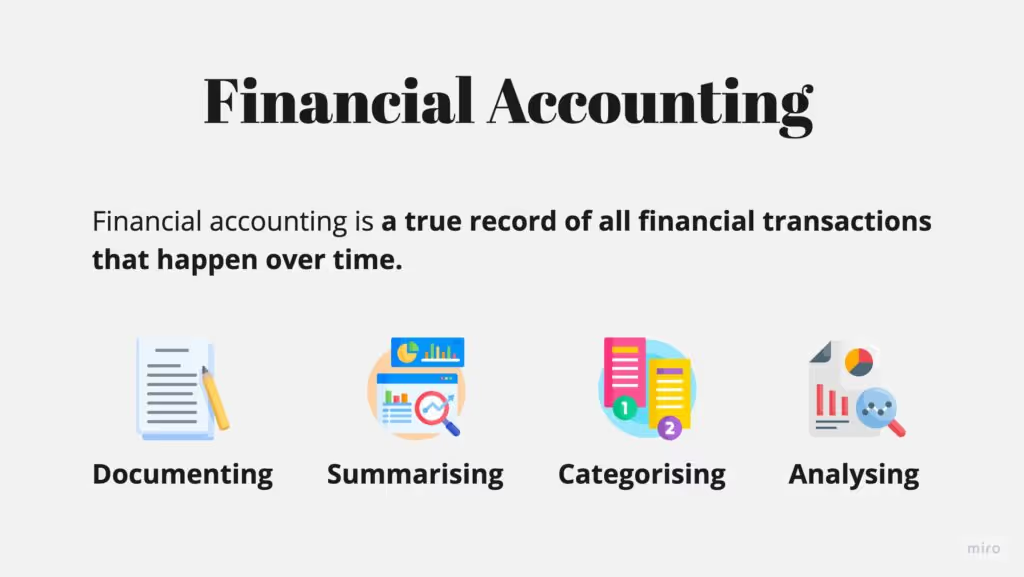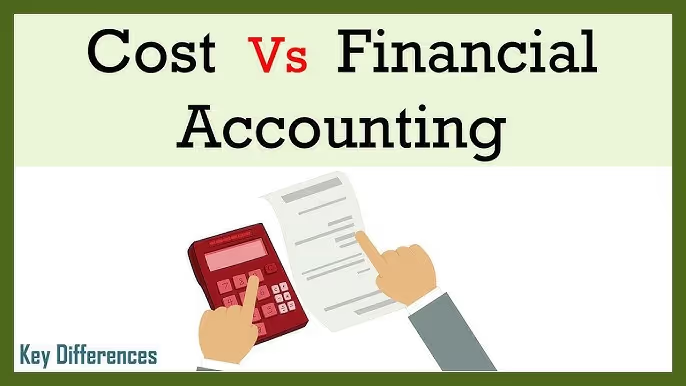In the modern business world, where every decision counts, the ability to track, record, and interpret financial data is essential. This is where financial accounting plays a pivotal role. Whether you're a business owner, a student, or an aspiring accountant, understanding financial accounting is fundamental to making informed financial decisions.
In this comprehensive guide, we’ll answer key questions like what is financial accounting, what is the primary purpose of financial accounting, and explain the difference between cost accounting and financial accounting. We’ll also touch on related concepts such as financial statements, management accounting, and provide a clear financial accounting definition.
Let’s get started.
What Is Financial Accounting?

Financial accounting is the process of recording, summarizing, and reporting the financial transactions of a business over a specific period. It involves preparing standardized reports—such as the income statement, balance sheet, and cash flow statement—that reflect a company's financial performance and position.
Financial Accounting Definition:
Financial accounting is a branch of accounting that deals with recording, classifying, and summarizing financial transactions to provide information that is useful in making business decisions.
The reports generated through financial accounting are primarily intended for external stakeholders such as investors, creditors, tax authorities, and regulatory agencies.
Also Read: What is an MBA in Financial Accounting?
What Do You Mean by Financial Accounting?

You may wonder, what do you mean by financial accounting in a practical sense? Think of it as the financial language of business. It translates daily transactions—like sales, purchases, and expenses—into meaningful numbers that tell a story about how a business is performing.
For example:
- A company sells a product → The sale is recorded in the books.
- The cost of making the product is noted → Expenses are tracked.
- At month-end, a report is generated → This becomes part of the financial statement.
In essence, financial accounting answers the question: "Where does the business stand financially?"
What Is Financial Statement in Accounting?

One of the key outputs of financial accounting is the financial statement. But what is financial statement in accounting, exactly?
Financial statements are formal records that summarize a business's financial activities. The main types include:
- Income Statement – Shows revenues and expenses to determine net profit or loss.
- Balance Sheet – Provides a snapshot of assets, liabilities, and equity at a specific point in time.
- Cash Flow Statement – Details how cash is generated and used in operating, investing, and financing activities.
- Statement of Changes in Equity – Tracks changes in the owner’s equity over time.
These documents are essential for external users to assess a company’s financial health, risk level, and performance trends.
What Is the Primary Purpose of Financial Accounting?
Understanding the primary purpose of financial accounting helps clarify its role in business decision-making.
Primary Purpose:
To provide accurate, relevant, and timely financial information to external stakeholders for decision-making, compliance, and performance evaluation.
Let’s break this down:
- Accuracy ensures financial data reflects true business activity.
- Relevance means the information is useful and applicable.
- Timeliness means reports are available when stakeholders need them.
External stakeholders (like investors or banks) rely on financial accounting to:
- Determine whether to invest or lend
- Evaluate a company’s profitability and solvency
- Ensure compliance with laws and tax requirements
Difference Between Cost and Financial Accounting

Many people confuse cost accounting and financial accounting, but they serve very different purposes.
In short, financial accounting tells you what happened, while cost accounting explains why it happened and how to improve it.
Difference Between Financial Accounting and Management Accounting
Another important comparison is the difference between financial accounting and management accounting.
While financial accounting is about compliance and transparency, management accounting focuses on planning, forecasting, and strategic decisions. Together, they offer a complete financial picture.
Core Principles of Financial Accounting
To maintain consistency and credibility, financial accounting follows certain fundamental principles. These include:
- Accrual Principle – Transactions are recorded when they occur, not when cash is exchanged.
- Consistency Principle – Same accounting methods are used over time for comparability.
- Going Concern Principle – Assumes the business will continue operating in the foreseeable future.
- Matching Principle – Expenses should be matched with revenues in the period they are incurred.
- Conservatism Principle – Anticipate losses but not gains.
These principles ensure that financial information is trustworthy and comparable across companies and industries.
Importance of Financial Accounting in Business
Financial accounting is not just about compliance. It’s a critical tool for:
- Evaluating performance – Through profit/loss trends and ratio analysis.
- Securing funding – Investors and banks rely on accurate financials.
- Tax planning – Accurate reports simplify tax filing and reduce liabilities.
- Business strategy – Helps in setting goals based on past performance.
- Transparency – Builds trust among stakeholders.
Whether you're managing a startup or running a large corporation, financial accounting gives you the visibility you need to grow sustainably.
Who Uses Financial Accounting Reports?
- Investors – To evaluate profitability and risk.
- Lenders – To assess creditworthiness.
- Regulatory Bodies – To ensure compliance with financial laws.
- Suppliers – To determine a company's financial stability.
- Management – Although primarily for external use, it also aids in internal planning.
Common Careers in Financial Accounting
If you're considering a career in financial accounting, here are some common roles:
- Financial Accountant
- Auditor
- Tax Consultant
- Accounts Payable/Receivable Specialist
- Financial Analyst
These roles exist in nearly every industry and often require knowledge of tools like QuickBooks, SAP, or Oracle Financials, and certifications such as CPA or ACCA.
Challenges in Financial Accounting
Despite its importance, financial accounting is not without challenges:
- Complex regulations (GAAP, IFRS)
- Risk of errors or fraud
- Changing tax laws
- Technological disruptions (AI and automation)
- Need for continuous learning and upskilling
The good news? With the right training and tools, these challenges can be overcome.
How to Learn Financial Accounting
Want to master financial accounting? Here's how to get started:
Online Learning Platforms:
- Coursera: Offers university-level accounting courses.
- edX: Learn from institutions like Harvard and MIT.
- LinkedIn Learning: Quick, career-focused accounting tutorials.
- YouTube Channels: Like Farhat Accounting Lectures or AccountingStuff.
Books to Read:
- Financial Accounting by Libby, Libby, and Short
- Accounting Made Simple by Mike Piper
- Principles of Accounting by Needles & Powers
Conclusion: Why Financial Accounting Matters More Than Ever
In a data-driven world, knowing what is financial accounting and how it works is essential for students, professionals, and entrepreneurs alike. It's more than just numbers—it's the backbone of every financial decision in business.
To summarize:
- Financial accounting helps track, analyze, and report financial performance.
- It enables transparency, compliance, and strategic decision-making.
- Understanding the difference between cost and financial accounting, and management accounting, gives you a well-rounded financial perspective.
- Whether you're aiming for a career in finance or want to manage your own business, these skills are indispensable.
Now that you understand the primary purpose of financial accounting and the value of financial statements, it’s time to put that knowledge into practice.
FAQ: Financial Accounting & Reporting
What is financial accounting and reporting?
It involves recording, summarizing, and disclosing a company’s financial transactions and performance through financial statements (income statement, balance sheet, cash flows) for stakeholders.
What are the main objectives of financial reporting?
To provide useful, reliable, and comparable information about financial position and performance to shareholders, investors, regulators, and other stakeholders.
What accounting standards are used in financial reporting?
Common standards include IFRS (International Financial Reporting Standards) and GAAP (Generally Accepted Accounting Principles), depending on region.
What is the difference between financial accounting and management accounting?
Financial accounting is for external reporting (shareholders, regulators); management accounting is for internal use (planning, decision making, budgeting).
What skills are needed for financial accounting and reporting?
Skills like strong accounting principles, attention to detail, knowledge of standards (IFRS/GAAP), analytical ability, Excel proficiency, and accounting software (SAP, Tally etc.).

.avif)






